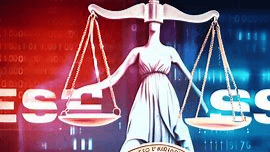
The legal dispute between Coinbase, one of the leading cryptocurrency exchanges, and the U.S. Securities and Exchange Commission (SEC) has reached a new phase as the SEC responded to Coinbase’s argument challenging the agency’s jurisdiction in the lawsuit. The SEC’s filing on Friday counters Coinbase’s claims and provides insights into the ongoing legal battle, shedding light on the regulatory framework surrounding digital assets and securities laws.
The SEC’s lawsuit against Coinbase, filed a month ago, accuses the exchange of operating as an unregistered broker, clearinghouse, and exchange, while also listing at least 13 cryptocurrencies that the SEC considers unregistered securities. Coinbase, in its initial filing, argued that the SEC lacks jurisdiction to bring a lawsuit against the company. However, the SEC’s response challenges Coinbase’s position and asserts its legal grounds for pursuing the case.
In its filing, the SEC highlights that Coinbase had previously acknowledged the possibility that federal securities laws could apply to its listings. The regulator points out that Coinbase, a multi-billion-dollar entity with sophisticated legal counsel, claimed to be unaware of the potential violation of federal securities laws. The SEC refutes this claim, stating that Coinbase had adopted the legal framework established by the U.S. Supreme Court to assess whether certain cryptocurrencies met the requirements of federal securities laws. Additionally, Coinbase had actively discouraged crypto issuers from associating their tokens with securities, indicating a clear understanding of the regulatory landscape.
The SEC’s response further underlines Coinbase’s own public filings, which acknowledge the possibility that listed assets might be considered securities. This acknowledgment reinforces the SEC’s position that Coinbase was aware of the potential applicability of securities laws to its operations. The SEC argues that Coinbase made a calculated decision to take on the risk of operating in this manner in order to fuel its business growth.
Coinbase’s arguments regarding investment contracts and secondary market trading are also addressed in the SEC’s filing. Coinbase claimed that an investment contract must involve a formal contract and that investment contracts are only considered asset sales if they are traded on secondary markets. The SEC refutes these claims by stating that the Howey Test, a legal framework used to determine whether an investment contract exists, does not require a formal contract. Additionally, the SEC asserts that transactions on secondary markets can still violate securities laws, contrary to Coinbase’s argument.
To support its stance on secondary market trading, the SEC cites its recent legal victory against LBRY, a decentralized content-sharing platform. This example serves to demonstrate that the SEC’s position aligns with its enforcement efforts in relation to transactions on secondary markets. Furthermore, the SEC dismisses Coinbase’s major questions doctrine argument, asserting that the case involves the SEC’s exercise of its longstanding authority to enforce statutory requirements.
The next significant step in the legal proceedings is the scheduled hearing on July 13 in the District Court for the Southern District of New York. During this hearing, both parties will present their arguments and engage in discussions, providing an opportunity to further clarify their positions.
The outcome of this legal battle between Coinbase and the SEC will have far-reaching implications for the cryptocurrency industry. It will set precedents regarding the application of securities laws to digital assets and establish regulatory boundaries for cryptocurrency exchanges. The case is closely watched by market participants, as it will shape the future landscape of cryptocurrency regulations in the United States.
As the industry continues to evolve, regulatory clarity becomes increasingly important. Market participants, including exchanges, seek clear guidelines and rules to ensure compliance and foster a healthy and transparent ecosystem. The outcome of this case will contribute to shaping the regulatory framework and determining how cryptocurrency exchanges operate within the legal boundaries defined by the SEC.
In conclusion, the SEC’s response to Coinbase’s jurisdiction argument in their ongoing lawsuit sheds light on the regulatory dynamics surrounding cryptocurrencies and securities laws. The SEC challenges Coinbase’s claims, emphasizing the exchange’s prior knowledge of potential securities laws applicability. The upcoming hearing will provide a platform for both parties to present their cases and will have significant implications for the cryptocurrency industry’s regulatory landscape. The outcome will influence how exchanges and market participants navigate the evolving regulatory environment, promoting investor protection and fostering responsible growth within the cryptocurrency ecosystem.
Get the latest Crypto & Blockchain News in your inbox.